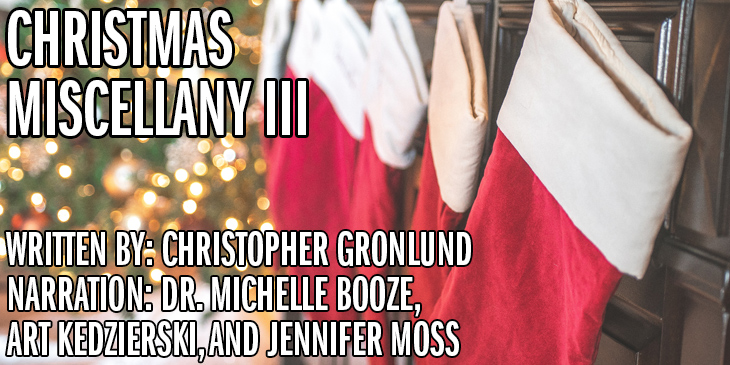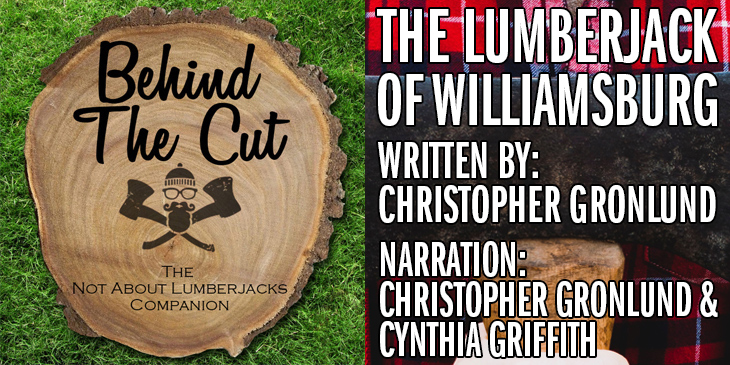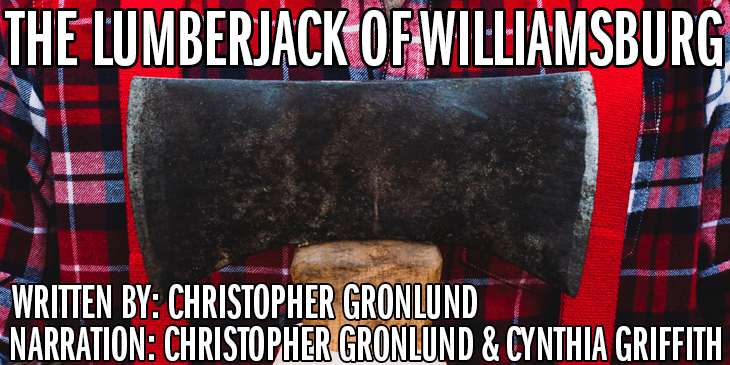[Music Fades in]
Female Narrator:
This is Behind the Cut with Christopher Gronlund. The companion show to Not About Lumberjacks.
Christopher Gronlund:
I’d be lying if I said there never comes a point each year when I feel like I’ve forced myself into having to write two episodes of Not About Lumberjacks: the November anniversary episode (that is always the most not about lumberjacks tale of the year) and now — the annual Christmas episode. But when it’s over, I’m always proud of the efforts.
I started the Christmas stories on a whim…just throwing out seven very short stories in 2017. Most of ‘em aren’t even holiday related in any way – I mean, hell, there’s only one in the bunch.
Last year, it was two out of three stories that could be deemed holiday-worthy in any way.
This year, the three tales are all based around Christmas.
More than that, this is the first time I’ve not narrated any of the stories. Last year, my wife narrated the first story, and Patrick Walsh of the Screamqueenz podcast narrated another. I narrated the final story.
This year, I was lucky to get three great narrators: Dr. Michelle Booze, Art Kedzierski, and Jennifer Moss.
It was only after listening to the entire episode that I realized it’s one of my all-time favorite episodes of the show. I knew the stories were solid, but it was only after hearing them narrated by others that I realized how strong the episode really is.
I liked the three stories, but I have a confession: every story you hear on the show is a rough draft with a polish. I’m not sure I’ve ever done rewrites on a short story. (What you hear is largely a first draft…or, at most, my wife might catch something and say, “Ya know, this part doesn’t make sense to me,” and I fix things.) The stories knock around my head for a little while, and then sometimes they explode onto the page with little effort, but most times it takes a bit of shaping. Once all the pieces are down, though, the story is all there, and it gets cleaned up a bit…and then I call things done.
Working this way, piecing things together mostly on lunch breaks at work…it can sometimes be hard to know if a story is working or not. Often, it’s only when listening to a narrated episode that I can tell the efforts were worth it.
This year’s Christmas episode was definitely worth it. I was lucky enough to be present as a couple people listened, and my only regret is not putting a little more space between the first and second episode to account for people tearing up at the end of “My Grandmother Wrestled Bears.”
* * *
I’m not sure what 2020 holds for Not About Lumberjacks. I’m wrapping up a story for later this month, and I have a rather long mystery I’ve toyed with releasing. (If I do, it would be the longest episode to date…perhaps twice as long as whatever the current longest episode is.) And I have bits and pieces of other stories in various states or work.
But as I’ve mentioned during the endings of recent episodes, I need to turn my focus back on a novel—the second in a series. (The first is currently being submitted to agents, and I’ve been surprised by some of the interest people have had.)
So Not About Lumberjacks may go on hiatus for a handful of months while working through all that’s going on with books. Of course, it’s entirely possible nothing happens with the novel currently being submitted. If that’s the case, Not About Lumberjacks will likely become the writing focus in my life. (I mean, hell, at that point, you might even get a second feed for serialized novels if that’s your thing.)
It would be very easy for me to view 2020 as a do or die year for my writing. Common sense says if the first book in a series doesn’t sell, you drop the rest of it and you work on something else that might. But the story I’m working on is something I must see through, no matter what…even if it’s only read by a handful of people. And after so many close calls over the decades, you reach a point where you think, “I’ve grown so tired of the chase…”
But I don’t view 2020 as the year writing things happen or I give up not only the chase but writing itself. Because I enjoy writing and…here, I have a place for the stories I write. Going back to common sense, I mean hell, common sense also says Not About Lumberjacks is a futile endeavor. Most people stop a thing that takes the effort this show takes without any compensation. I can’t even say I do it for a large following because it seems there are maybe 50 die-hard listeners…and maybe 100 – 150 over time. (Only a few episodes on the site have over 200 listens.)
It would be easiest for me to just write stories and share them with a handful of friends and family. No effort into narrating and sound design. None of that.
There are moments in every episode’s production when I think, “God, I hate this part of the process…it’s such a slog. Why do I do this to myself?”
But then I hear something I’ve written come to life in a manner it would never sound like in my mind. And I hear from a small group of people about how much they loved it.
I work with narrators who put their own cadence and inflection into these concrete stories I’ve written, shaping them into remarkable constructs I could never imagine them becoming.
This year’s Christmas episode was one of those kinds of shows.
And that’s quite a gift for a writer knocking out stories on his lunch break at work…
And so, here’s to a good year…
* * *
[Outro music fades in…]
Christopher Gronlund:
Thank you for listening to Not About Lumberjacks and Behind the Cut. Theme music for Behind the Cut is a tune called Reaper by Razen. Visit nolumberjacks.com for information about the music, episodes, and voice talent.
At the end of the month it’s a strange father and son tale featuring a handful of narrators.
Until next time: be mighty, and keep your axes sharp!





